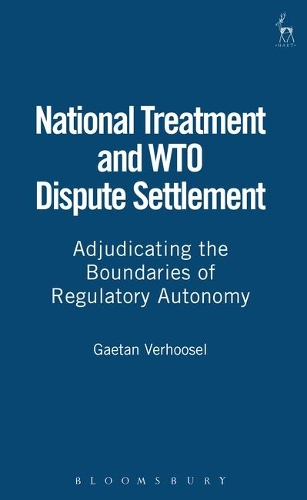
National Treatment and WTO Dispute Settlement: Adjudicating the Boundaries of Regulatory Autonomy
(Hardback)
Publishing Details
National Treatment and WTO Dispute Settlement: Adjudicating the Boundaries of Regulatory Autonomy
By (Author) Gaetan Verhoosel
Bloomsbury Publishing PLC
Hart Publishing
8th April 2002
United Kingdom
Classifications
Tertiary Education
Non Fiction
International trade and commerce
Public international law: economic and trade
Public international law: treaties and other sources
Political structure and processes
Peace studies and conflict resolution
382.92
Physical Properties
Hardback
144
Width 138mm, Height 216mm, Spine 11mm
Description
The percieved impact of WTO law on the domestic regulatory autonomy of WTO members is increasingly becoming the subject of controversy and debate. This text brings together in an integrated analytical framework how the main WTO adjudicators, i.e. the panels and the Appellate Body, have construed those rules. A critical analysis identifies the flaws or weaknesses of these quasi-judical solutions and their potential consequences for members' regulatory autonomy. In an attempt to identify a more proper balance between the WTO law and regulatory autonomy, it develops an innovative interpretation of the National Treatment obligations in GATT and GATS, drawing upon compelling arguements from legal, logic and economic theory.
Reviews
His book is a thought-provoking addition to the body of work that considers the polarization between States and the potential Frankenstein they have created to govern their trade relations. -- Rajesh Pillai * World Trade Review *
Gaetan Verhoosel's book provides an important new contribution to the long-standing debate over the proper application of the national treatment obligation. [It] provides a fresh look at these issues, and offers some important insights into how the difficulties in applying the national treatment principle could be resolved. -- Simon Lester * Journal of International Economic Law *
Author Bio
Dr Gaetan Verhoosel is with the Legal Affairs Division of the WTO, where he advises WTO dispute settlement panels.
